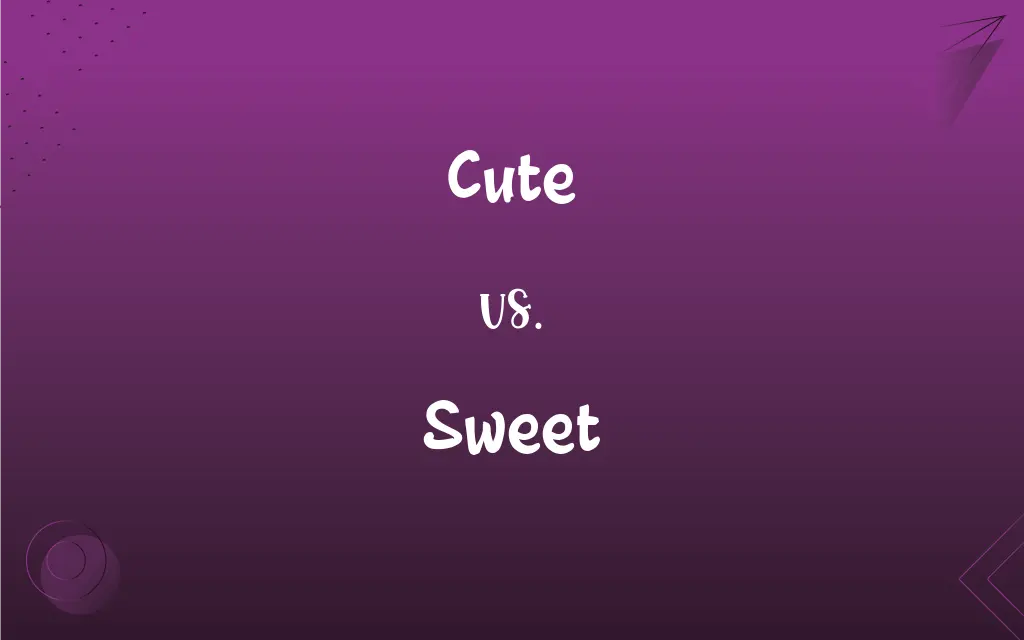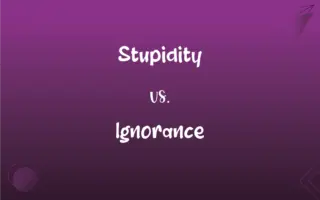Cute vs. Sweet: What's the Difference?
Edited by Aimie Carlson || By Janet White || Updated on November 21, 2023
Cute vs. Sweet: "Cute" often refers to endearing physical appearance or actions, while "sweet" describes a kind, thoughtful nature or taste.

Key Differences
"Cute" is a term often applied to describe a pleasing and charming appearance or manner, particularly in the context of being endearing or innocent. It's commonly used to refer to the physical attractiveness that invokes a sense of warmth or affection. On the other hand, "sweet" is predominantly used to depict someone's character, specifically their kindness, consideration, or affection toward others. While "cute" leans more towards superficial qualities, "sweet" implies a depth of character.
"Cute" can also refer to specific actions or behaviors that are seen as adorable or endearing. A puppy playing or a child's giggle might be described as cute. "Sweet," however, is used in response to acts of kindness or thoughtfulness. For example, someone helping an elderly person with their groceries or a child sharing their toys is considered sweet. Both "cute" and "sweet" carry positive connotations, but "cute" is about the delight from appearance or actions, whereas "sweet" concerns the moral qualities behind actions.
In another sense, "cute" is often used with a slightly patronizing tone, diminishing the seriousness or importance of someone or something, whereas "sweet" generally lacks such connotations. A proposal might be called "cute" if it lacks sophistication, but a well-thought-out gesture of affection is more likely to be referred to as "sweet." Both words, while positive, have different implications in terms of respect and maturity.
When referring to taste, "sweet" is a basic taste sensation along with salty, sour, bitter, and umami, perceived when eating foods rich in sugar. "Cute" doesn’t have a correlation with taste in the culinary world. While "sweet" is multifaceted, applying to character, actions, and sensory experiences, "cute" is generally limited to appearances and certain behaviors.
Regarding interpersonal relationships, someone might call their partner "cute" when they're endeared by their quirks or physical features, while "sweet" is used to appreciate their kind gestures or loving words. Both "cute" and "sweet" are complimentary, but they highlight different aspects of why a person is cherished.
ADVERTISEMENT
Comparison Chart
Primary Association
Appearance/Behavior
Character/Taste
Connotation
Endearing, charming
Kind, thoughtful
Usage Context
Physical/Actions
Moral qualities/Actions/Taste
Tone
Sometimes patronizing
Generally sincere
Relation to Taste
Not applicable
Direct (sugar-rich foods)
ADVERTISEMENT
Cute and Sweet Definitions
Cute
Attractive in a pretty or endearing way.
The baby’s giggle was so cute that everyone smiled.
Sweet
Having the taste or flavor characteristic of sugar or honey.
The cake was deliciously sweet.
Cute
Delightfully pretty or dainty.
What a cute dress you have on!
Sweet
Pleasing to the senses; gratifying.
She received a sweet compliment that made her day.
Cute
Attractive or pretty in a youthful or dainty way
A cute puppy.
A child wearing a cute outfit.
Sweet
Kind, gracious, or gentle in disposition.
He had a sweet nature that made him loved by all.
Cute
Sexually attractive; good-looking
A cute boyfriend.
Sweet
Having the taste of sugar or a substance containing or resembling sugar, as honey or saccharin.
Cute
Obviously contrived to charm; precious
"[He] mugs so ferociously he kills the humor—it's an insufferably cute performance" (David Ansen).
Sweet
Containing or derived from sugar.
Cute
Clever or witty, especially in an impertinent or evasive way, as in falsely suggesting that one is ignorant about the matter at hand.
Sweet
Retaining some natural sugar; not dry
A sweet wine.
Cute
Possessing physical features, behaviors, personality traits or other properties that are mainly attributed to infants and small or cuddly animals; e.g. fair, dainty, round, and soft physical features, disproportionately large eyes and head, playfulness, fragility, helplessness, curiosity or shyness, innocence, affectionate behavior.
Our reaction to cute attributes is understood as the way nature ensures mammals care for their young.
Sweet
Pleasing to the senses; agreeable
The sweet song of the lark.
A sweet face.
Cute
Lovable, charming, attractive or pleasing, especially in a youthful, dainty, quaint or fun-spirited way.
Let's go to the mall and look for cute girls.
Sweet
Pleasing to the mind or feelings; gratifying
Sweet revenge.
Cute
Sexually attractive or pleasing; gorgeous.
He's got such cute buns.
Sweet
Having a pleasing disposition; lovable
A sweet child.
Cute
Affected or contrived to charm; mincingly clever; precious; cutesy.
The actor's performance was too cute for me. All that mugging to the audience killed the humor.
Don't get cute with me, boy!
Sweet
Kind; gracious
It was sweet of him to help out.
Cute
Mentally keen or discerning (See also acute)
Cute trick, but can you do it consistently?
Sweet
Fragrant; perfumed
A sweet scent.
Cute
Evincing cleverness; surprising in its elegance or unconventionality (but of limited importance).
There's a cute alternative proof of this using lambda calculus.
Sweet
Not saline or salted
Sweet water.
Sweet butter.
Cute
Clever; sharp; shrewd; ingenious; cunning.
Sweet
Not spoiled, sour, or decaying; fresh
Sweet milk.
Cute
Pleasantly attractive, in a delicate way; - said of children, young ladies, pet animals and some objects, but seldom of adults; as, a cute child; a cute kitten; a cute little house; a cute statue.
Sweet
Free of acid or acidity
Sweet soil.
Cute
Smart-alecky or impertinent; as, a cute remark.
Sweet
Low in sulfur content
Sweet fuel oil.
Cute
Affectedly clever.
Sweet
(Music) Of, relating to, or being a form of jazz characterized by adherence to a melodic line and to a time signature.
Cute
Attractive especially by means of smallness or prettiness or quaintness;
A cute kid with pigtails
A cute little apartment
Cunning kittens
A cunning baby
Sweet
Remarkable; outstanding.
Cute
Obviously contrived to charm;
An insufferably precious performance
A child with intolerably cute mannerisms
Sweet
Used as an intensive
Took his own sweet time to finish.
Earns a sweet million per year.
Cute
Clever or shrewd, especially in a self-seeking or superficial way.
Her cute remarks on the topic earned a round of applause.
Sweet
In a sweet manner; sweetly.
Cute
Striving to be charming or attractive.
The kitten's cute antics entertained us all evening.
Sweet
Sweet taste or quality; sweetness.
Cute
Affectedly or mincingly pretty or clever; precious.
The artist had a cute way of adding vibrant colors to the painting.
Sweet
Something sweet to the taste.
Sweet
Foods, such as candy, pastries, puddings, or preserves, that are high in sugar content.
Sweet
(Informal) Sweet potatoes
Candied sweets.
Sweet
A sweet dish, such as pudding, served as dessert.
Sweet
A sweetmeat or confection.
Sweet
A dear or beloved person.
Sweet
Something pleasing to the mind or feelings.
Sweet
Having a pleasant taste, especially one relating to the basic taste sensation induced by sugar.
A sweet apple
Sweet
Having a taste of sugar.
Sweet
(wine) Retaining a portion of sugar.
Sweet wines are better dessert wines.
Sweet
Not having a salty taste.
Sweet butter
Sweet
Having a pleasant smell.
A sweet scent
Sweet
Not decaying, fermented, rancid, sour, spoiled, or stale.
Sweet milk
Sweet
Having a pleasant sound.
A sweet tune
Sweet
Having a pleasing disposition.
A sweet child
You're so sweet!
Sweet
Having a helpful disposition.
It was sweet of him to help out.
Sweet
(mineralogy) Free from excessive unwanted substances like acid or sulphur.
Sweet gas
Sweet soil
Sweet crude oil
Sweet
(informal) Very pleasing; agreeable.
The new Lexus was a sweet birthday gift.
Sweet
(slang) Doing well; in a good or happy position.
Sweet
Romantically fixated; enamored with; fond of.
The attraction was mutual and instant; they were sweet on one another from first sight.
Sweet
; not salt or brackish.
Sweet water
Sweet
.
Sweet
To the eye; beautiful; mild and attractive; fair.
A sweet face
A sweet colour or complexion
Sweet
An intensifier.
Sweet
Used as a positive response to good news or information.
They're making a sequel? Ah, sweet!
Sweet
In a sweet manner.
Sweet
(uncountable) The basic taste sensation induced by sugar.
Sweet
A confection made from sugar, or high in sugar content; a candy.
Sweet
A food eaten for dessert.
Can we see the sweet menu, please?
Sweet
Synonym of sweetheart, a term of affection.
Good evening, my sweet.
Sweet
(obsolete) That which is sweet or pleasant in odour; a perfume.
Sweet
(obsolete) Sweetness, delight; something pleasant to the mind or senses.
Sweet
To sweeten.
Sweet
Having an agreeable taste or flavor such as that of sugar; saccharine; - opposed to sour and bitter; as, a sweet beverage; sweet fruits; sweet oranges.
Sweet
Pleasing to the smell; fragrant; redolent; balmy; as, a sweet rose; sweet odor; sweet incense.
The breath of these flowers is sweet to me.
Sweet
Pleasing to the ear; soft; melodious; harmonious; as, the sweet notes of a flute or an organ; sweet music; a sweet voice; a sweet singer.
To make his English sweet upon his tongue.
A voice sweet, tremulous, but powerful.
Sweet
Pleasing to the eye; beautiful; mild and attractive; fair; as, a sweet face; a sweet color or complexion.
Sweet interchangeOf hill and valley, rivers, woods, and plains.
Sweet
Fresh; not salt or brackish; as, sweet water.
Sweet
Not changed from a sound or wholesome state. Specifically: (a) Not sour; as, sweet milk or bread. (b) Not state; not putrescent or putrid; not rancid; as, sweet butter; sweet meat or fish.
Sweet
Plaesing to the mind; mild; gentle; calm; amiable; winning; presuasive; as, sweet manners.
Canst thou bind the sweet influence of Pleiades?
Mildness and sweet reasonableness is the one established rule of Christian working.
Sweet
That which is sweet to the taste; - used chiefly in the plural.
Sweet
That which is sweet or pleasant in odor; a perfume.
Sweet
That which is pleasing or grateful to the mind; as, the sweets of domestic life.
A little bitter mingled in our cup leaves no relish of the sweet.
Sweet
One who is dear to another; a darling; - a term of endearment.
Sweet
Sweetly.
Sweet
To sweeten.
Sweet
English phonetician; one of the founders of modern phonetics (1845-1912)
Sweet
A dish served as the last course of a meal
Sweet
A food rich in sugar
Sweet
The taste experience when sugar dissolves in the mouth
Sweet
The property of containing sugar
Sweet
Having a pleasant taste (as of sugar)
Sweet
Having a sweet nature befitting an angel or cherub;
An angelic smile
A cherubic face
Looking so seraphic when he slept
A sweet disposition
Sweet
Pleasing to the ear;
The dulcet tones of the cello
Sweet
One of the four basic taste sensations; very pleasant; like the taste of sugar or honey
Sweet
Pleasing to the senses;
The sweet song of the lark
The sweet face of a child
Sweet
Pleasing to the mind or feeling;
Sweet revenge
Sweet
Having a natural fragrance;
Odoriferous spices
The odorous air of the orchard
The perfumed air of June
Scented flowers
Sweet
(used of wines) having a sweet taste
Sweet
Not soured or preserved;
Sweet milk
Sweet
With sweetening added
Sweet
Not having a salty taste;
Sweet water
Sweet
In an affectionate or loving manner (`sweet' is sometimes a poetic or informal variant of `sweetly');
Susan Hayward plays the wife sharply and sweetly
How sweet the moonlight sleeps upon this bank
Talking sweet to each other
Sweet
Cherished; dear.
Holding her sweet newborn was an unforgettable moment.
Sweet
Not soured or spoiled.
The milk is still sweet and good to drink.
FAQs
Does "cute" have a patronizing tone?
It can, depending on context.
Can food be described as "cute"?
Yes, if it has an appealing presentation, not taste.
Is "sweet" related only to taste?
No, it also describes kindness and thoughtfulness.
Can objects be "cute"?
Yes, if their design or appearance is perceived as endearing.
Can "cute" and "sweet" be used interchangeably?
Not usually, as "cute" refers more to appearance or actions, and "sweet" to character or taste.
Does "cute" imply superficiality?
Sometimes, as it often pertains to external qualities.
Can a personality trait be "cute"?
If it manifests in endearing actions or expressions, yes.
Is "cute" related to age?
Often, it's associated with the young but can be applied broadly.
Are "cute" and "sweet" subjective terms?
Yes, their perception can vary greatly among individuals.
Can an act of kindness be "cute"?
Generally, kind acts are "sweet," but they can be "cute" if they also appear endearing or charming.
Does "sweet" imply innocence?
Not directly, but it often accompanies acts perceived as innocent or pure-hearted.
Is "sweet" used for superficial gestures?
Rarely, as it usually implies genuine kindness.
Are there negative connotations to "sweet"?
It can be, if it's perceived as excessive or insincere.
Can animals be "sweet"?
Yes, if they display affectionate or gentle behaviors.
Can a situation be "sweet"?
Yes, if it evokes warmth, pleasure, or contentment.
Is "cute" a formal term?
Generally, it's considered informal.
Can "cute" be used sarcastically?
Yes, especially when something is trying too hard to be appealing.
Is "sweet" ever used in a professional context?
Rarely, as it's generally reserved for personal interactions.
Does "sweet" refer to simplicity?
Not directly, though sweet acts are often uncomplicated.
Can "cute" describe a clever idea?
Yes, if it’s clever in an endearing or witty way.
About Author
Written by
Janet WhiteJanet White has been an esteemed writer and blogger for Difference Wiki. Holding a Master's degree in Science and Medical Journalism from the prestigious Boston University, she has consistently demonstrated her expertise and passion for her field. When she's not immersed in her work, Janet relishes her time exercising, delving into a good book, and cherishing moments with friends and family.
Edited by
Aimie CarlsonAimie Carlson, holding a master's degree in English literature, is a fervent English language enthusiast. She lends her writing talents to Difference Wiki, a prominent website that specializes in comparisons, offering readers insightful analyses that both captivate and inform.






































































